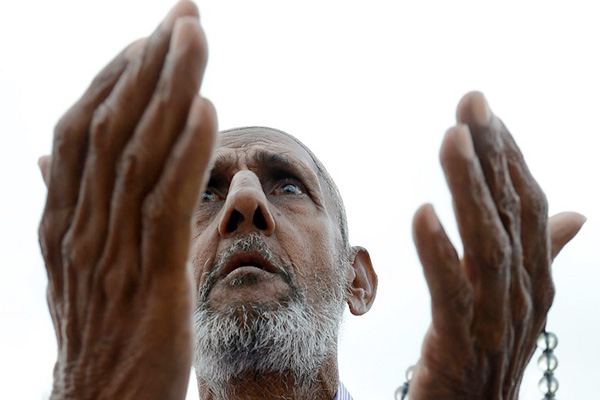
File photo. Lakruwan Wanniarachchi—AFP
Clerics refuse to close mosques in the country despite mounting coronavirus spread
The Sindh and Balochistan provincial governments on Thursday banned congregational prayers in mosques after senior clerics announced that they would not suspend Friday prayers, merely “limit” their attendance and advise youth under 18 and elderly above 50 to pray at home.
In a press conference with Special Assistant to the P.M. on Health Dr. Zafar Mirza and Planning Minister Asad Umar, Religious Affairs Minister Noorul Haq Qadri said that mosques would not shut their doors. However, he claimed, worshippers would be kept at minimum levels to curb the spread of COVID-19.
He reiterated a decision taken during a meeting between ulema and President Arif Alvi in which it was proposed that children under 18 and elderly over 50 would be discouraged from offering prayers at mosques. In addition, anyone with a cough or fever should also pray at home, he added.
The ulema’s decision flies in the face of data revealed by Mirza on Wednesday; he said the majority of confirmed cases in Pakistan had been found in people aged between 21 and 30—and not the elderly or very young. By allowing mosques and congregational prayers to proceed, this age group is likely to help spread the virus even further.
After this press conference, which made clear that mosques would not be shut under the ongoing lockdown that has placed restrictions on most places where large numbers of people can gather, the Sindh government announced the suspension of all congregational prayers at mosques, including Friday prayers, to maintain social distancing.
Adviser to the Sindh C.M. Murtaza Wahab said the government had made the decision after consultation with clerics of all schools of thought. “Major decision by the Sindh government. To contain spread of coronavirus, people can no more offer prayers at mosques,” he posted on Twitter. “Only staff of mosques of maximum five people can offer prayers at mosques.”
The ban on congregational prayers in Sindh is set to continue until April 5, when the prevailing lockdown is also set to end.
Late on Thursday night the Balochistan government followed Sindh’s decision. In a notification posted on Twitter by Chief Minister Jam Kamal Khan, the provincial government said that for the next 12 days, no more than 3 to 5 people would be allowed to offer prayers at mosques. Noting that mosques would remain open, it said no one would be allowed to congregate there and prayers should be offered at home.
On Friday, less than an hour before Friday prayers were set to commence, the Punjab government also announced that it was limiting to five people or less the number of congregants who could offer Friday prayers at mosques. “This decision is being taken to curb the spread of coronavirus,” read a notification issued by authorities. There has been no move to ban congregational prayers in Khyber-Pakhtunkhwa province as yet.
On Wednesday, at the urging of President Alvi, Egypt’s Al-Azhar issued a fatwa saying that people should offer prayers at their houses, instead of mosques, in the wake of the coronavirus pandemic. However, a majority of ulema of the Barelvi and Deobandi sects said they did not agree with this decree and have vowed to resist moves to close mosques.
